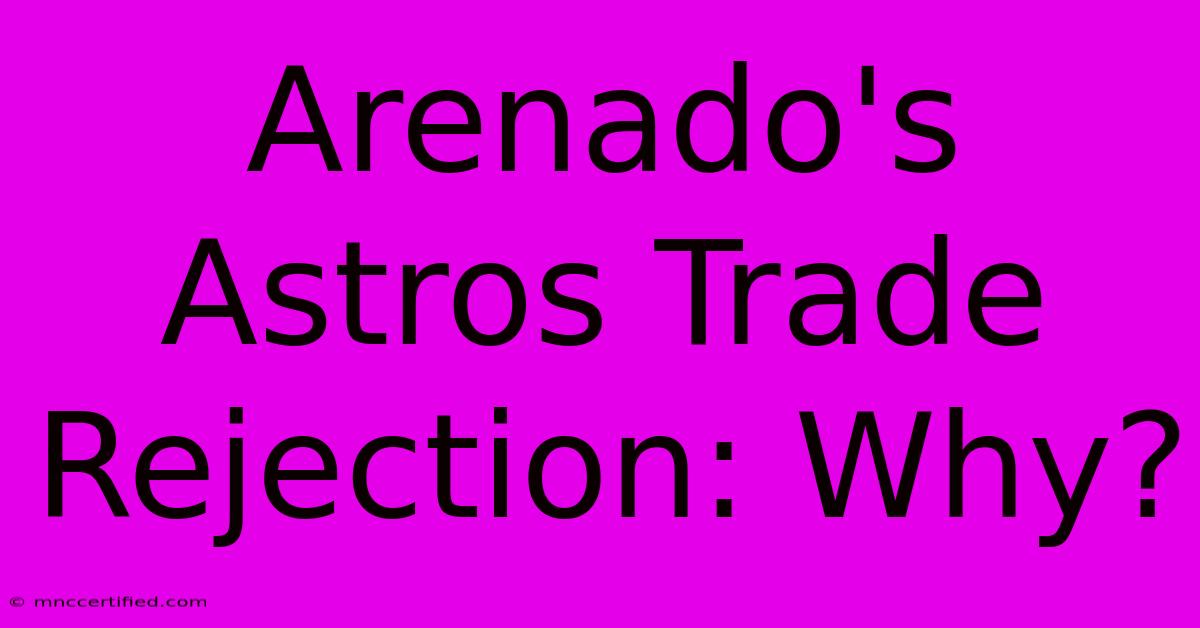Arenado's Astros Trade Rejection: Why?

Table of Contents
Arenado's Astros Trade Rejection: Why the Third Baseman Said No to Houston
Nolan Arenado's recent rejection of a potential trade to the Houston Astros has sent shockwaves through the baseball world. While the specifics of the offer remain undisclosed, the decision itself speaks volumes about Arenado's priorities and the complexities of player agency in the MLB. This article delves into the potential reasons behind Arenado's rejection, exploring both on-field and off-field factors.
On-Field Considerations: A Look at the Astros' Roster and Arenado's Fit
One crucial aspect to consider is the potential fit within the Astros' existing roster. While Houston boasts a consistently strong team, the addition of Arenado would have necessitated significant roster adjustments. Analyzing the current infield situation reveals potential challenges:
- Positional Conflicts: The Astros already have a solid third baseman in Alex Bregman. A trade for Arenado might have involved shifting Bregman, a highly-valued player, to another position, potentially disrupting the team's established dynamic. Arenado's preference for playing his natural position might have been a significant factor in his decision.
- Offensive Style: Arenado's power hitting style might have complemented the Astros' existing lineup, but a potential clash in offensive strategies couldn't be ruled out. The Astros' approach, often characterized by a blend of speed and power, may not have perfectly aligned with Arenado's more traditional power-hitting approach.
- Winning Window: While both the Cardinals and Astros are competitive teams, Arenado might have assessed the long-term prospects of each franchise differently, impacting his decision. He may have seen a more stable and potentially longer-term path to contention with his current team or another potential suitor.
Off-Field Factors: Contract, Family, and Personal Preferences
Beyond on-field considerations, a multitude of off-field factors might have contributed to Arenado's decision. These include:
- Contractual Obligations: Arenado's substantial contract is a significant consideration for any team. While his performance justifies his salary, it necessitates a commitment from the acquiring team, possibly impacting other roster moves. A lack of alignment on contractual expectations might have hindered the trade.
- Personal Preferences and Family: A player's personal life often influences major career decisions. Location preferences, family considerations, and the overall feel of a city and organization are all significant aspects often overlooked in trade discussions. Houston, while a successful franchise, may not have perfectly aligned with Arenado's off-field priorities.
- Team Culture and Chemistry: The importance of team culture and chemistry cannot be understated. Arenado may have prioritized playing for an organization with a culture that better aligns with his values and playing style. Reports about a strong clubhouse culture in St. Louis could have contributed to this decision.
The Larger Picture: Player Agency and Trade Dynamics
Arenado's rejection highlights the increasing power of player agency in modern baseball. Players are increasingly involved in shaping their career paths, and their preferences are being taken more seriously by teams. This shift towards player empowerment signifies a changing landscape in MLB trades.
Conclusion: A Multifaceted Decision
Ultimately, Arenado's decision was likely a complex one, weighing numerous on-field and off-field factors. The lack of transparency regarding the specifics of the trade offer prevents a definitive answer, but the considerations outlined above provide a reasonable framework for understanding his rejection of the Astros. The episode serves as a valuable case study in the intricacies of MLB trades and the growing influence of player agency in shaping the sport's future. The ongoing impact of this decision on both the Astros and Cardinals remains to be seen, but it undoubtedly reshapes the landscape of the MLB's upcoming season.

Thank you for visiting our website wich cover about Arenado's Astros Trade Rejection: Why?. We hope the information provided has been useful to you. Feel free to contact us if you have any questions or need further assistance. See you next time and dont miss to bookmark.
Featured Posts
-
Kraken Trade Kakko Joins Seattle
Dec 20, 2024
-
Thursday Night Football Broncos Chargers Odds
Dec 20, 2024
-
Arenado Astros Trade Reasons For Refusal
Dec 20, 2024
-
What Was Karen Hugers Dui Verdict
Dec 20, 2024
-
Currys Scoreless Game Grizzlies Defeat Warriors
Dec 20, 2024